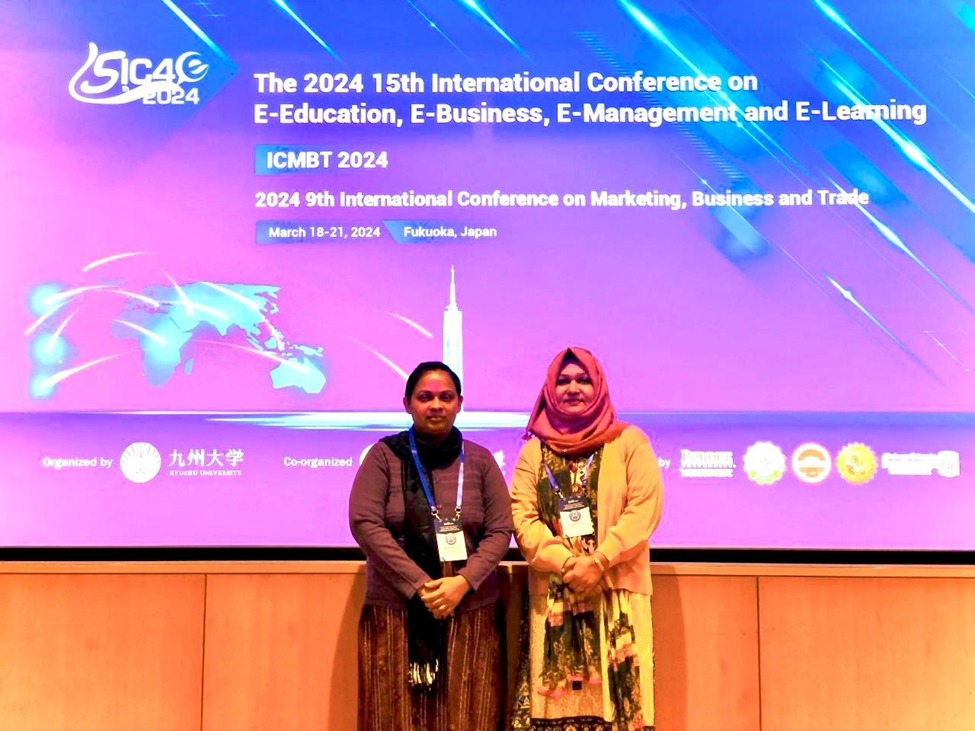Dr. Qazi Mahdia Ghyas and Ms. Taslima Akter, employees of Dohatec New Media, recently presented a research paper titled “Critical Evaluation of Key Performance Indicators (KPI) in Procurement Management Information System (PROMIS): The Case of Bangladesh” at the 15th International Conference on E-Education, E-Business, E-Management and E-Learning (IC4E) held in Fukuoka, Japan. Their paper provided a thought-provoking analysis of the effectiveness of PROMIS, a part of the electronic procurement system implemented in Bangladesh.
Unfortunately, there is a lack of research on the effectiveness of e-GP (electronic government procurement) in Bangladesh. Dr. Ghyas and Ms. Akter conducted this research to address this gap. This research paper is of significant importance due to various reasons. One such reason is its opportunity to showcase the successful implementation of e-GP in Bangladesh, positioning the country as a leading player in the global e-GP arena. The paper also critically evaluated the key performance indicators (KPIs) in PROMIS, an electronic procurement system that has the potential to revolutionize public procurement by enhancing efficiency, accountability, and transparency. Dr. Ghyas, Ms. Akter, and Dohatec New Media have significantly contributed to the advancement of e-GP practices. Sharing their research and insights with the international community has paved the way for a future where efficient and transparent public procurement will be the norm.
Simplifying Public Procurement in Bangladesh: e-GP Research Explained
The study conducted by Dohatec researchers evaluates the effectiveness of Bangladesh’s e-Government Procurement (e-GP) system. The analysis focuses on the practical improvements brought about by the e-GP system, which streamlines public procurement processes. It reveals that businesses now have enhanced access to public tenders and can submit bids electronically, fostering increased efficiency and transparency. The e-GP system also facilitates cost-effective procurement for government entities by ensuring a wider pool of qualified bidders and minimizing the risk of errors or irregularities through digital recordkeeping. The researchers analyzed the Key Performance Indicators (KPIs) to uncover the key dimensions driving the e-GP system’s performance in Bangladesh, using factor analysis to identify underlying structures in data. The study aims to provide valuable insights for policymakers and stakeholders optimizing Bangladesh’s e-GP system by pinpointing these core dimensions potentially applicable to evaluating and enhancing e-GP systems in other developing countries. However, the study had some limitations, such as partial data for some KPIs, collinearity issues, and the need for further investigation and research. For example, it was hard to find data about fraud and corruption, which are hard to measure.
A Catalyst for e-GP and Digital Governance in Bangladesh
Dr. Ghyas and Ms. Akter’s successful presentation at IC4E 2024 has significant implications for the company’s reputation as a leading e-GP system development and implementation expert. The presentation also highlighted Bangladesh’s strides towards digital governance through the e-GP system, which can serve as an inspiration and a potential model for other developing countries seeking to enhance transparency and efficiency in public procurement processes.
Sharing Bangladesh’s e-GP success story at the conference generated valuable recognition from a global audience, which can help identify areas for further improvement within the system. Collaboration with international experts and stakeholders can lead to future upgrades, such as enhanced data security protocols or integration with cutting-edge technologies.
Dohatec’s international recognition at IC4E can potentially attract new clients seeking expertise in optimizing e-GP systems for other countries. This recognition also serves as a springboard for promoting advancements within Bangladesh’s e-GP system and fostering the country’s digital governance aspirations.
Looking Forward: A Collaborative Future for e-GP and Bangladesh
Successful collaboration is the key to innovation and development in e-GP systems and governance technologies. Dohatec researchers presented their findings at IC4E 2024, proving the importance of sharing knowledge and best practices globally. This experience will guide their future work as they leverage international connections to explore collaborative projects that can aid other countries in developing or refining their e-GP systems. Bangladesh will also benefit from continued international dialogue, identifying areas for improvement within its e-GP system. Ultimately, global collaboration is essential to unlock the full potential of e-GP systems and promote transparent governance practices worldwide, with Dohatec researchers leading the way towards this bright future.
